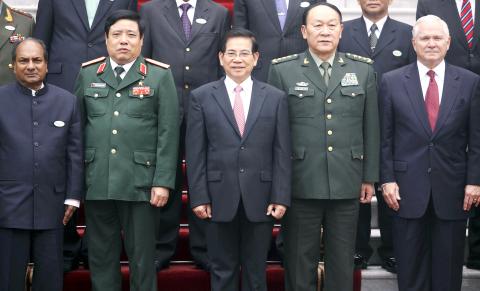AP, HANOI
China worked to calm nerves yesterday among Asian neighbors jittery over its recent attempts to assert greater control over disputed waters, while the US stressed its national interest in keeping those seas free for commerce.
US Secretary of Defense Robert Gates said the US has a stake in the growing number of disputes about ownership of Asian island chains and ship routes through waters China claims.

Photo: REUTERS
“We have a national interest in freedom of navigation, in unimpeded economic development and commerce and in respect for international law,” Gates told an ASEAN defense ministers’ forum in Hanoi.
The message was strong and the audience unmistakable, but Gates avoided a direct confrontation with China. He never mentioned the country by name during a brief address to the group, which included his Chinese counterpart, General Liang Guanglie (梁光烈).
Several Asian countries have expressed concern over increasingly aggressive maritime moves by Beijing, including its response to a ship collision last month off disputed islands — known as Senkaku in Japan and Diaoyutai (釣魚台) in Taiwan and China — that plunged relations between China and Japan to a five-year low.
China tried to ease tensions yesterday by reassuring its neighbors that it wants to work together.
“China pursues a defense policy that is defensive in nature. China’s defense development is not aimed to challenge or threaten anyone, but to ensure its security and promote international and regional peace and stability,” Liang said in his speech to the forum. “Security of a country relies not only on self-defense capabilities, but also on mutual trust with others.”
ASEAN defense ministers, along with their counterparts from the US, China, Russia, Japan, Australia, New Zealand, India and South Korea attended the meeting.
“The United States has always exercised our rights and supported the rights of others to transit through, and operate in, international waters,” Gates said. “This will not change, nor will our commitment to engage in activities and exercises together with our allies and partners.”
Meanwhile, a senior US defense official said in Hanoi yesterday that Beijing appears to be adopting a slightly more conciliatory tone over territorial disputes in the South China Sea, backing away from describing the area as part of its “core interests,” putting the issue on a par with Tibet or Taiwan.
“They now, at least in some of our interactions with them, appear to have backed away somewhat from the ‘core interest’ argument,” said the official, who spoke on condition of anonymity.
Chinese leaders seem “to be seeking to come up with other ways to articulate their approach to these issues,” the official told reporters. “It is probably fair to conclude that there is some internal debate in Beijing about exactly how they approach this set of issues.”

DAREDEVIL: Honnold said it had always been a dream of his to climb Taipei 101, while a Netflix producer said the skyscraper was ‘a real icon of this country’ US climber Alex Honnold yesterday took on Taiwan’s tallest building, becoming the first person to scale Taipei 101 without a rope, harness or safety net. Hundreds of spectators gathered at the base of the 101-story skyscraper to watch Honnold, 40, embark on his daredevil feat, which was also broadcast live on Netflix. Dressed in a red T-shirt and yellow custom-made climbing shoes, Honnold swiftly moved up the southeast face of the glass and steel building. At one point, he stepped onto a platform midway up to wave down at fans and onlookers who were taking photos. People watching from inside

MAKING WAVES: China’s maritime militia could become a nontraditional threat in war, clogging up shipping lanes to prevent US or Japanese intervention, a report said About 1,900 Chinese ships flying flags of convenience and fishing vessels that participated in China’s military exercises around Taiwan last month and in January last year have been listed for monitoring, Coast Guard Administration (CGA) Deputy Director-General Hsieh Ching-chin (謝慶欽) said yesterday. Following amendments to the Commercial Port Act (商港法) and the Law of Ships (船舶法) last month, the CGA can designate possible berthing areas or deny ports of call for vessels suspected of loitering around areas where undersea cables can be accessed, Oceans Affairs Council Minister Kuan Bi-ling (管碧玲) said. The list of suspected ships, originally 300, had risen to about

A Vietnamese migrant worker yesterday won NT$12 million (US$379,627) on a Lunar New Year scratch card in Kaohsiung as part of Taiwan Lottery Co’s (台灣彩券) “NT$12 Million Grand Fortune” (1200萬大吉利) game. The man was the first top-prize winner of the new game launched on Jan. 6 to mark the Lunar New Year. Three Vietnamese migrant workers visited a Taiwan Lottery shop on Xinyue Street in Kaohsiung’s Gangshan District (崗山), a store representative said. The player bought multiple tickets and, after winning nothing, held the final lottery ticket in one hand and rubbed the store’s statue of the Maitreya Buddha’s belly with the other,

Japan’s strategic alliance with the US would collapse if Tokyo were to turn away from a conflict in Taiwan, Japanese Prime Minister Sanae Takaichi said yesterday, but distanced herself from previous comments that suggested a possible military response in such an event. Takaichi expressed her latest views on a nationally broadcast TV program late on Monday, where an opposition party leader criticized her for igniting tensions with China with the earlier remarks. Ties between Japan and China have sunk to the worst level in years after Takaichi said in November that a hypothetical Chinese attack on Taiwan could bring about a Japanese